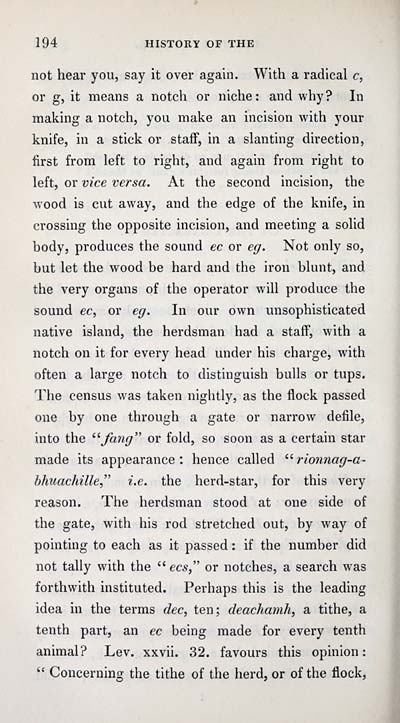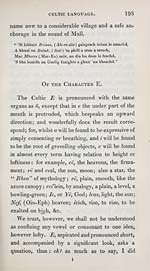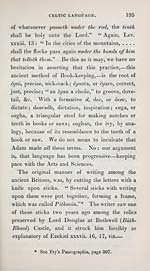Download files
Complete book:
Individual page:
Thumbnail gallery: Grid view | List view

194 HISTORY OF THE
not hear you, say it over again. With a radical c,
or g, it means a notch or niche: and why? In
making a notch, you make an incision with your
knife, in a stick or staiF, in a slanting direction,
first from left to right, and again from right to
left, or vice versa. At the second incision, the
wood is cut away, and the edge of the knife, in
crossing the opposite incision, and meeting a solid
body, produces the sound ec or eg. Not only so,
but let the wood be hard and the iron blunt, and
the very organs of the operator wiU produce the
sound ec, or eg. In our own unsophisticated
native island, the herdsman had a stafF, with a
notch on it for every head under his charge, with
often a large notch to distinguish bulls or tups.
The census was taken nightly, as the flock passed
one by one thi'ough a gate or narrow defile,
into the ^^fang" or fold, so soon as a certain star
made its appearance : hence called " rionnag-a-
hhuachille" i.e. the herd-star, for this very
reason. The herdsman stood at one side of
the gate, with his rod stretched out, by way of
pointing to each as it passed : if the number did
not tally with the "ecs," or notches, a search was
forthwith instituted. Perhaps this is the leading
idea in the terms dec, ten; deachamh, a tithe, a
tenth part, an ec being made for every tenth
animal? Lev. xxvii. 32. favours this opinion :
" Concernin? the tithe of the herd, or of the flock,
not hear you, say it over again. With a radical c,
or g, it means a notch or niche: and why? In
making a notch, you make an incision with your
knife, in a stick or staiF, in a slanting direction,
first from left to right, and again from right to
left, or vice versa. At the second incision, the
wood is cut away, and the edge of the knife, in
crossing the opposite incision, and meeting a solid
body, produces the sound ec or eg. Not only so,
but let the wood be hard and the iron blunt, and
the very organs of the operator wiU produce the
sound ec, or eg. In our own unsophisticated
native island, the herdsman had a stafF, with a
notch on it for every head under his charge, with
often a large notch to distinguish bulls or tups.
The census was taken nightly, as the flock passed
one by one thi'ough a gate or narrow defile,
into the ^^fang" or fold, so soon as a certain star
made its appearance : hence called " rionnag-a-
hhuachille" i.e. the herd-star, for this very
reason. The herdsman stood at one side of
the gate, with his rod stretched out, by way of
pointing to each as it passed : if the number did
not tally with the "ecs," or notches, a search was
forthwith instituted. Perhaps this is the leading
idea in the terms dec, ten; deachamh, a tithe, a
tenth part, an ec being made for every tenth
animal? Lev. xxvii. 32. favours this opinion :
" Concernin? the tithe of the herd, or of the flock,
Set display mode to: Large image | Transcription
Images and transcriptions on this page, including medium image downloads, may be used under the Creative Commons Attribution 4.0 International Licence unless otherwise stated. ![]()
| Early Gaelic Book Collections > Hew Morrison Collection > Adhamh agus Eubh, no Craobh Sheanachais nan Gàël > (324) |
|---|
| Permanent URL | https://digital.nls.uk/76900606 |
|---|
| Description | A selection of items from a collection of 320 volumes and 30 pamphlets of literary and religious works in Scottish Gaelic. From the personal library of Hew Morrison, the first City Librarian of Edinburgh. |
|---|
| Description | Selected items from five 'Special and Named Printed Collections'. Includes books in Gaelic and other Celtic languages, works about the Gaels, their languages, literature, culture and history. |
|---|

